 Petzlover
Petzlover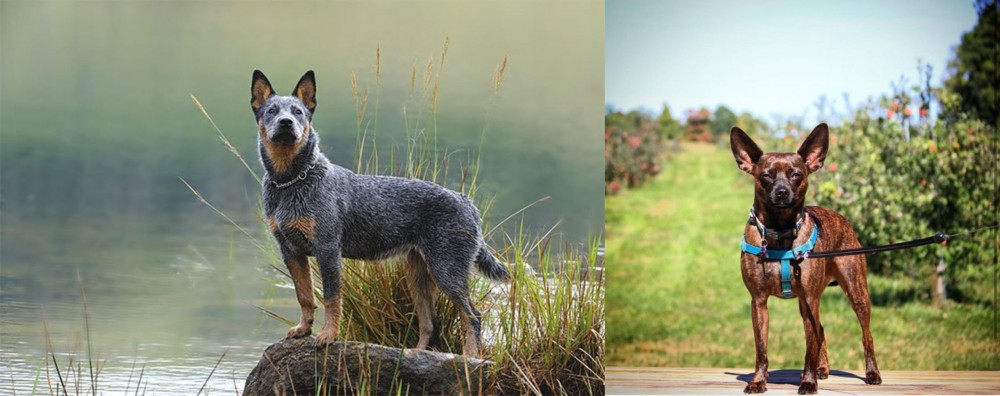 Blue Healer is originated from Australia but Bospin is originated from United States. Blue Healer may grow 13 cm / 6 inches higher than Bospin. Blue Healer may weigh 11 kg / 25 pounds more than Bospin. Both Blue Healer and Bospin has same life span. Both Blue Healer and Bospin has almost same litter size. Both Blue Healer and Bospin requires Low Maintenance.
Blue Healer is originated from Australia but Bospin is originated from United States. Blue Healer may grow 13 cm / 6 inches higher than Bospin. Blue Healer may weigh 11 kg / 25 pounds more than Bospin. Both Blue Healer and Bospin has same life span. Both Blue Healer and Bospin has almost same litter size. Both Blue Healer and Bospin requires Low Maintenance.
 It was in 1802 that George Hall arrived in New South Wales, establishing 2 cattle stations. He had a problem – getting his thousands of cattle to the Sydney markets. He began looking at the prospect of a droving dog and imported a number of dogs of which a blue mottled dog emerged.
It was in 1802 that George Hall arrived in New South Wales, establishing 2 cattle stations. He had a problem – getting his thousands of cattle to the Sydney markets. He began looking at the prospect of a droving dog and imported a number of dogs of which a blue mottled dog emerged.
The dogs were crossed with dingoes and by 1840 the Halls Heelers were used by the Halls. However with the death of one of the Halls, their cattle stations went to action and the dogs, the Halls Heelers became available.
The dogs attracted attention, and the term ‘Australian Cattle Dog’ was adopted. The name referred to those dogs coming from Thomas Hall's ‘Heelers’. There have been many arguments about the origin of the breed, but the red or blue offspring known as Hall's Heelers were proven cattle drovers, and with further breeding experiments which included the Australian Kelpie, dingoes and the Dalmation, by 1893, the tough, robust working breed known as the Blue Heeler or the Australian Cattle Dog came about.
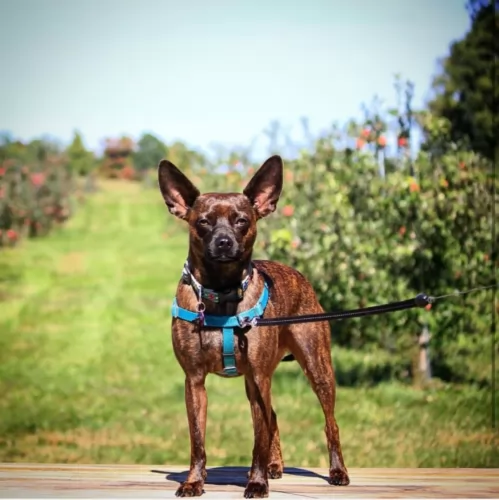 The Bospin is a fairly new breed of dog and is the result of cross-breeding between the Boston Terrier and the Miniature Pinscher.
The Bospin is a fairly new breed of dog and is the result of cross-breeding between the Boston Terrier and the Miniature Pinscher.
Mixed breed dogs are often healthier than full blood dogs and are becoming a popular choice. The origin of the Bospin is unknown. We know that the Boston Terrier hails from Boston in the USA and the Miniature Pinscher from Germany.
 Blue Heelers are medium-sized, sturdy, compact dogs who are somewhat longer than tall. The female Blue Heeler measures roughly 43–48cm at the withers, while the male measures about 46–51cm. If your Blue Heeler is in tip top condition, he’ll weigh about 15 to 22 kilograms. They are muscular with pointed, erect ears, dark eyes and long tails which are mostly hanging downwards. Their dense coats are blue- or red speckled and sometimes with tan markings.
Blue Heelers are medium-sized, sturdy, compact dogs who are somewhat longer than tall. The female Blue Heeler measures roughly 43–48cm at the withers, while the male measures about 46–51cm. If your Blue Heeler is in tip top condition, he’ll weigh about 15 to 22 kilograms. They are muscular with pointed, erect ears, dark eyes and long tails which are mostly hanging downwards. Their dense coats are blue- or red speckled and sometimes with tan markings.
The Blue Heeler is a ball of energy and he is clever too. You won’t find him sitting around for too long, and if there is sign of a walk or a ball game, he’s in! He is an independent dog, and although he makes a wonderful family pet, he tends to attach himself to that one special person in his life. He is a natural watchdog and protector of his human family.
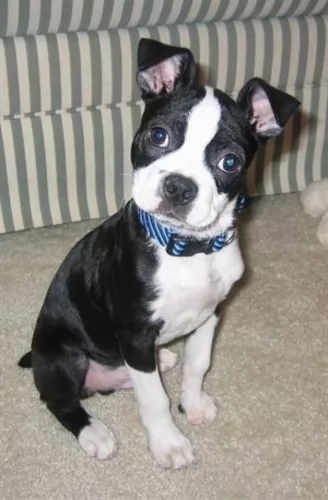 The Bospin, a cross between the smooth haired Boston Terrier and the Miniature Pinscher can actually get any combination and characteristics of either of these two breeds. found in either breed. The Bospin in a small to medium sized dog who can live to be up to 15 years of age.
The Bospin, a cross between the smooth haired Boston Terrier and the Miniature Pinscher can actually get any combination and characteristics of either of these two breeds. found in either breed. The Bospin in a small to medium sized dog who can live to be up to 15 years of age.
He has a short coat, but his looks will essentially depend on which is the more dominant breed. Regardless of which breed he takes after in looks, he will be a muscular little dog with long, lean legs and a long tail. They have small muzzles and a fairly long nose with brown eyes and upright ears. The short coat can be in a number of colours such as brown, beige or brindle, with black and white being a more common colour.
The Bospin’s personality can be a blend of the Boston Terrier and the Miniature Pinscher. They’ve become such popular little dogs, full of fun and just loving to be with their human family. Because they are fairly even tempered, they make excellent family pets and will get on well with children in the home as well as other pets. This is a small dog but he isn’t a yapper. He isn’t going to make a wonderful watchdog as he can be quite friendly with strangers.
 Training and socializing of your Blue Heeler will ensure that your dog does what you want him to. The Blue Heeler is an intelligent, responsive dog and training can benefit him, turning him into an outstanding family pet, good with children and other pets in the home.
Training and socializing of your Blue Heeler will ensure that your dog does what you want him to. The Blue Heeler is an intelligent, responsive dog and training can benefit him, turning him into an outstanding family pet, good with children and other pets in the home.
He is a playful, affectionate pet who doesn’t take easily to strangers, and this is what makes him such an excellent guard dog.
Your Blue Heeler is not an apartment dog as he requires a lot of exercise, and cooping him indoors for too long with nothing to do can lead to destructive behavior.
Head-strong, independent and robust, your Blue Heeler will need a firm owner who is boss. Add to the firm owner a lot of love and care, and you’ll have a devoted friend.
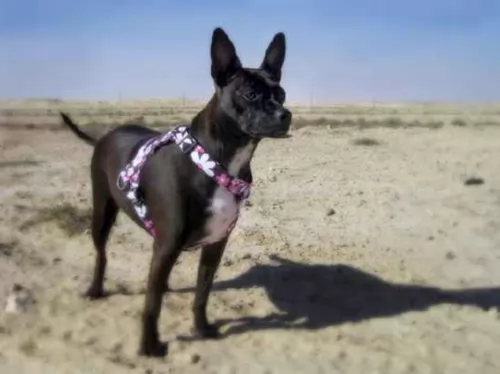 The Bospin is an adaptable dog and can easily fit into farm life or city life. When he is trained and socialized he makes an amicable pet, ready to be a loyal and devoted companion.
The Bospin is an adaptable dog and can easily fit into farm life or city life. When he is trained and socialized he makes an amicable pet, ready to be a loyal and devoted companion.
The Bospin’s personality can actually lean more towards either the Boston Terrier or the Miniature Pinscher, but you’re always going to have fun and games with these entertaining little dogs. They just love the companionship of their human family.
A Bospin needs to be brought into a stable environment so that he can adapt to his new home easily and not be confused by constant changes. Be responsible with your pet and make him one of your family and you’ll be rewarded with an entertaining, fun, loyal 4-legged friend.
 Australian cattle dogs are healthy and can live up to 15 years of age, but even so there are some genetic conditions that you will need to be aware of following
Australian cattle dogs are healthy and can live up to 15 years of age, but even so there are some genetic conditions that you will need to be aware of following
Eye issues which includes progressive retinal atrophy – this disease is an inherited disease of the retina of the eye where the rod cells are destined to die. Fortunately it is not painful for the dog. There are different types of inherited retinal degenerative diseases in dogs but going into detail with them is beyond the scope of this article. For more information you can chat to your vet.
Recessive piebald elleles - the Blue Heeler has recessive piebald alleles which can produce white in the skin and coat and which is linked to congenital hereditary deafness.
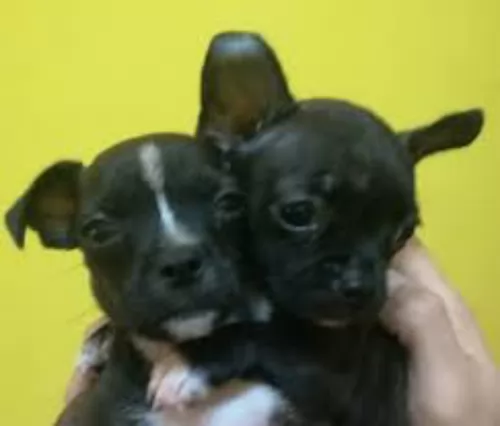 Your Bospin is a healthy dog breed, but the most healthiest pets can fall victim to health problems. There are some conditions that are specific to certain types of dogs and smaller breeds have their own set of worrisome dog ailments.
Your Bospin is a healthy dog breed, but the most healthiest pets can fall victim to health problems. There are some conditions that are specific to certain types of dogs and smaller breeds have their own set of worrisome dog ailments.
Smaller dogs or toy breeds have smaller skulls and sometimes their smaller mouths have to find room to house the 42 teeth that dogs have. This over-crowding can lead to dental disease.
This is a common problem in brachycephalic breeds – those dogs that have short, broad muzzles such as the Boston Terrier. Toy breeds are more prone to tracheal collapse, a common cause of airway obstruction in dogs where the dog develops a rasping cough and labored breathing.
This is a developmental orthopedic disease where you see degeneration of the femoral head and which can lead to arthritis. The disease affects young animals and more specifically toy breeds. Your dog will have trouble walking and will usually hold one leg up. Your dog can battle along with pain and arthritis.
 Remember that your Blue Heeler was once a full time cattle dog where he used to become totally and utterly exhausted from herding cattle. This is what he loved – the activity. If you have a Blue Heeler, you will need to provide him with plenty of exercise.
Remember that your Blue Heeler was once a full time cattle dog where he used to become totally and utterly exhausted from herding cattle. This is what he loved – the activity. If you have a Blue Heeler, you will need to provide him with plenty of exercise.
If you live on a farm, your Blue Heeler will be in his element because he can run, walk and swim to his heart’s content. If you keep your Blue Heeler in your back garden, you will need to provide him with ball games, rope games, long walks, running on a leash as you cycle and other activities.
Your Blue Heeler has a short, weather-resistant double coat. He’s not a heavy shedder, but he will have his share of seasonal shedding, so it’s a good idea to get into the habit of brushing him at least twice a week. This will get rid of all those loose hairs and keep his skin healthy by getting the blood flowing and distributing his natural oils.
Giving the best dog food for your Blue Heeler will come from either your home made food or a top quality commercially manufactured dog food. He is such a high energy dog, that your veterinarian can advise you on a dog food specially designed for high energy breeds.
These foods are well balanced and are enriched with amino acids and vitamins, promoting healthy bones and joints. Remember to include some raw meat into your dog’s diet and to ensure a constant source of cool, fresh water.
Ensure your Blue Heeler’s ongoing health by paying attention to ears, nails and teeth.
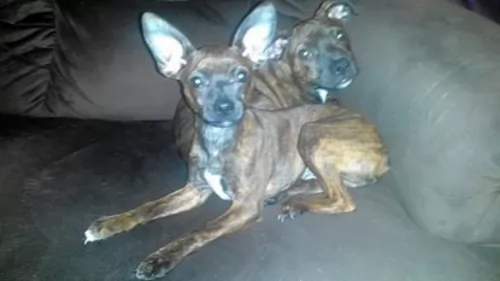 Because of the short coat and minimum shedding, your Bospin will only require minimal maintenance. Brush him down at least twice a week to keep the short coat free of loose hair and to also keep it shiny and glossy. As with any other dog breed, he should have his teeth brushed at 2 or 3 times a week with special dog toothpaste and toothbrush. Don’t be tempted to use human toothpaste. Check his ears too to make sure they are free of dirt and infection.
Because of the short coat and minimum shedding, your Bospin will only require minimal maintenance. Brush him down at least twice a week to keep the short coat free of loose hair and to also keep it shiny and glossy. As with any other dog breed, he should have his teeth brushed at 2 or 3 times a week with special dog toothpaste and toothbrush. Don’t be tempted to use human toothpaste. Check his ears too to make sure they are free of dirt and infection.
The Bospin is a hybrid breed and because he comes from two energetic dogs, you’ll need to provide him with activities to keep him busy. He will love to go on a walk with you and you can play ball games with him in the garden or even indoors. He isn’t a working dog so he isn’t going to demand too much activity, but it is better to get into the habit of exercising him regularly to keep him in good shape and to maintain his good health.
Bospins need to be fed carefully to avoid weight issues or health problems. Puppies need to eat frequently - 4 times a day. For your Bospin, always go for top quality commercially produced dog foods where meat is the top ingredient. Home made foods are always a wonderful choice for your pet and this can include meat, rice and vegetables.
If you’re unsure about feeding your dog, get advice from your vet. Always have fresh, cool water available and make sure you wash out the water bowl regularly.